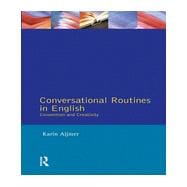
Note: Supplemental materials are not guaranteed with Rental or Used book purchases.
Purchase Benefits
What is included with this book?
| Preface | |
| Acknowledgements | |
| Introduction | |
| Aim and scope of the present study | |
| Material and method | |
| Frequency of conversational routines in spoken language | |
| Psychological aspects of conversational routines | |
| Conversational routines and ritualisation | |
| Lexicalization, grammaticalisation an idiomatisation | |
| Conversational routines and meaning | |
| Criteria of fixdedness | |
| The processing of conversational routines | |
| Routines and discourse | |
| Conversational routines and grammatical analysis | |
| A model for describing the strucural flexibility of conversational routines | |
| The pragmatic function of conversational routines | |
| The pragmatics of conversational routines | |
| Conversational routines and language teaching | |
| Thanking | |
| Introduction | |
| Thank you/thanks as an illolcutionary force indicating device | |
| Thanking and politeness | |
| Strategies of thanking | |
| Gratitude expressions | |
| Continuation patterns | |
| The grammatical analysis of gratitude expressions | |
| Prosody an fixedness | |
| Distribution of thanking over different texts | |
| Thank you/thanks as stems | |
| The functions of gratitutude expressions | |
| Thanking as a discourse marker | |
| The pragmatics of thanking | |
| Frames for thanking | |
| Conclusion | |
| Apologies | |
| Introduction | |
| Defining apologies | |
| Apologising strategies | |
| The form of apologising | |
| Continuation patterns | |
| The grammatical analysis of apology and expression | |
| Apologies and prosody | |
| Distribution of apologies over different texts | |
| Collocational fixedness and flexibility | |
| Apologies and function | |
| Retrospective and anticipatory apologies | |
| The structural function of apologies | |
| The type of offence | |
| Apologies and pragmatic frames | |
| Conclusion | |
| Requests and offers | |
| Introduction | |
| The speech act assignment mechanism and indirect speech acts | |
| Indirect speech acts and pragmatic principles | |
| Indirect speech acts and implicature | |
| Pragmatic ambiguity | |
| Defining requests | |
| Requestive strategies | |
| A taxonomy of requests | |
| Requests and politeness | |
| Continuation patterns | |
| The grammatical analysis of requestive routines | |
| Describing request expressions | |
| Indirect requests and speech act stems | |
| Types of stem | |
| Lexical mitigating devices | |
| Internal and external modifiers | |
| Referential strategies | |
| Requests and pragmatic conventions | |
| Imperatives | |
| Patterns expressing offers | |
| Conclusion | |
| Discourse markers as conversational routines | |
| Introduction | |
| Coherence and discourse markers | |
| Discourse markers characterized | |
| The metalinguistic function | |
| Relevance theory and communication | |
| The approach to discourse markers in this work | |
| The linguistic properties of discourse markers | |
| Contextual properties of discourse markers | |
| Functional properties of discourse markers | |
| Combinations in the discourse marker slot | |
| Discourse markers and cognitive frames | |
| Conclusion | |
| References | |
| Index | |
| Table of Contents provided by Publisher. All Rights Reserved. |
The New copy of this book will include any supplemental materials advertised. Please check the title of the book to determine if it should include any access cards, study guides, lab manuals, CDs, etc.
The Used, Rental and eBook copies of this book are not guaranteed to include any supplemental materials. Typically, only the book itself is included. This is true even if the title states it includes any access cards, study guides, lab manuals, CDs, etc.